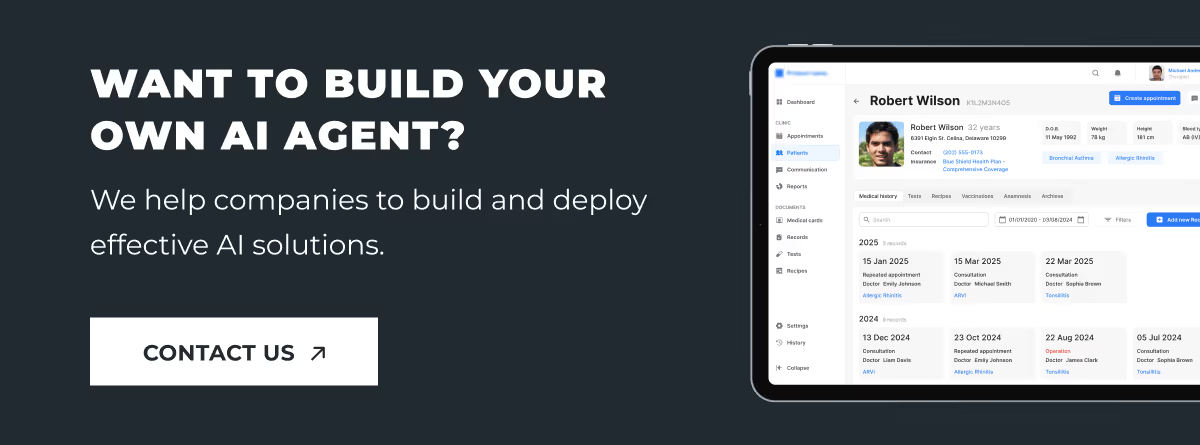The healthcare field is not a stranger to innovation. The last decades have brought many advancements — telemedicine, electronic health records (EHRs), remote monitoring devices and more. Yet, these digital tools haven’t fixed the most common problems in the medical system: behind the scenes, healthcare drowns in repetitive, semi-structured tasks.
According to the American Medical Association, doctors today spend about two hours on paperwork for every one hour they actually spend with patients. And patients? Stuck waiting, lost in the shuffle.
AI agents in healthcare offer a new approach. Unlike rule–based automation tools, AI agents act with a degree of autonomy. They can plan, carry out tasks, coordinate across systems, and adapt to new information along the way. All without human interaction.
In 2024, 66% of physicians reported using AI tools for documentation, billing, diagnosis assistance, translation, and more. Up from just 38% in 2023, marking a 78% year-over-year increase.
I’m Oleh Komenchuk, ML Lead at Uptech, a product development studio that’s been building thoughtful tech solutions for over 9 years. And in this article, I’ll share some insights on:
- What AI agents can realistically do in healthcare
- Where they’re already making the biggest impact
- What challenges still get in the way
Let’s get into it.
What Are AI Agents in Healthcare?
AI agents are systems that can perceive their environment, make informed decisions, and take action to reach a goal. They operate with a level of autonomy that sets them apart from traditional automation.
Specifically, in the healthcare field, they can handle tasks like monitoring patients’ vital signs, scheduling a follow-up, or flagging a physician when something looks off (I’ll get into the details a bit later in the article).
AI agents are typically built around the following loop:
See what’s happening → understand it → decide what to do → take action → learn and get better.
What Specific Tasks Can AI Agents Automate in Healthcare?
Now, let’s get to the practical question: Where are AI agents actually useful?
The short answer is, they are built for repetitive tasks that slow things down, take way too much time, and leave your team feeling drained. Not sure what those are yet? That’s fine. The list below is a good starting point.
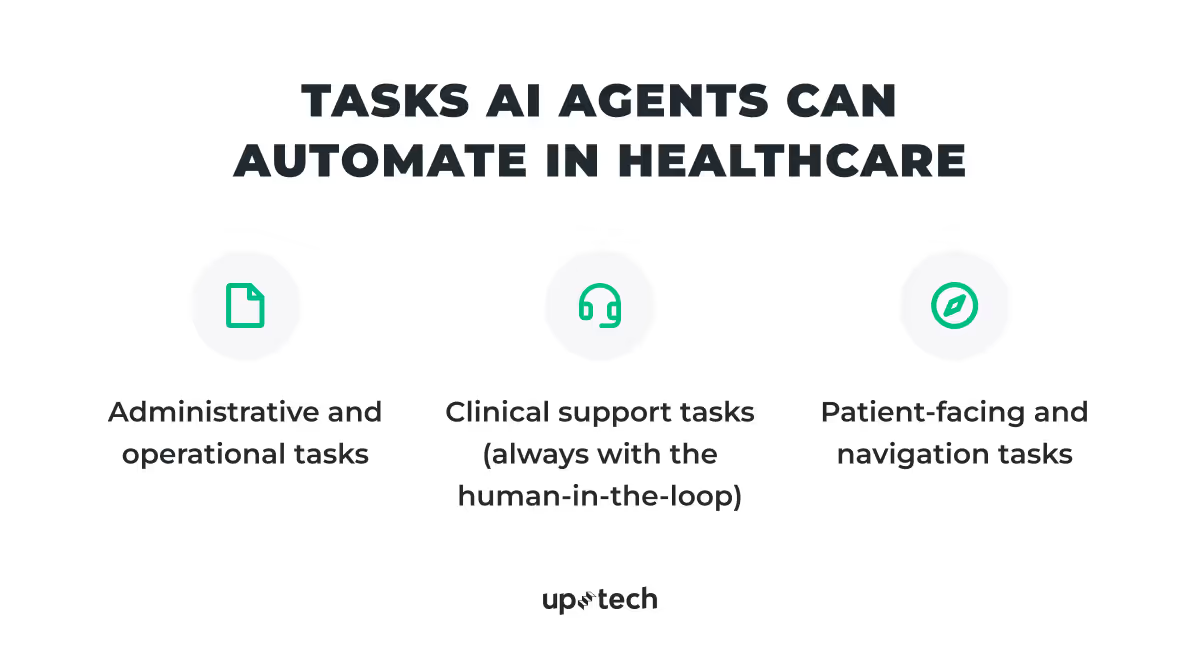
Administrative and operational tasks
Those are the tasks that are of high volume and low variation. AI agents can handle the load and keep things moving behind the scenes.
Here’s what they’re already doing in real-world healthcare settings:
Referral intake processing
AI agents can scan emails, EHRs, or portals to extract key details like demographics, contact details, medical history, or referral notes.. Then, they check for missing info and direct it to the right team. In many cases, they can also initiate or even schedule the appointment through integration with hospital systems.
Impact: Faster onboarding, fewer delays, way less manual entry.
AI agents can streamline routine steps, but complex or ambiguous cases still require human review.
Insurance eligibility verification
They can retrieve insurance information, connect to insurance providers, verify coverage in real time, and log information into EHRs or billing systems.
Impact: Fewer billing surprises, smoother check-ins.
AI supports the process, but final judgment remains with clinicians and staff.
Prior authorization submission
AI agents can auto-fill prior authorization forms using EHR data, attach clinical documentation, submit requests through the system, and track the status. If something’s missing, they can alert staff members.
Impact: Shorter delays, fewer denials, faster care access.
Great for speed and accuracy, as long as people stay in the loop for the tricky parts.
Appointment rescheduling and coordination
The AI agent can check calendars, find open time slots based on the provider’s schedule and the patient’s preferences, suggest new options, reschedule if needed, and update everything automatically.
Impact: Fewer no-shows, better calendar control.
AI agents help with logistics, but sensitive or last-minute cases still need human oversight.
Inbox and message management
Agents can scan patient messages, send auto-replies to common questions, prioritize based on urgency, and forward them to the right provider or team member when human judgment is needed.
Impact: Quicker response times. Less inbox chaos.
Escalation to clinicians is essential whenever urgency or clinical nuance is involved.
Clinical support tasks
In clinical workflows, agents don’t replace decisions, but support them. They lighten documentation loads, surface insights, and enable faster, more accurate decision-making. But they must operate under clinician oversight.
Specifically, AI agents can help with:
EHR note summarization
AI agents can scan clinical notes, pull out key details like diagnoses, vitals, treatment plans, and follow-ups, then organize everything in the EHR for easier access and reporting.
Impact: Saved charting time, improved documentation quality.
AI supports the process, but final judgment remains with clinicians and staff.
ICD/CPT coding assistance
AI gents can analyze clinical notes and suggest billing codes that align with documented care. They may also flag undercoded encounters or potential compliance risks.
Impact: More accurate reimbursement, reduced coding errors.
Suggested codes should always be confirmed by a certified medical coder.
Patient-facing and navigation tasks
In this area, AI agents make things easier to understand, improve communication, and help more people without losing the personal touch.
Pre-visit instructions
AI agents can send tailored prep instructions for procedures like colonoscopies or MRIs, confirm understanding, and offer a channel for last-minute questions.
Impact: Fewer appointment issues, better procedure outcomes.
Patient questions outside scripted instructions should be routed to clinical staff.
FAQ handling and triage
Agents can answer common questions, point patients to the right resource, or pass along concerns to a nurse or scheduler.
Impact: Lower staff workload, improved patient experience.
AI agents help with FAQs, but urgent or emotional cases still need a human response.
Chronic care reminders
Agents can keep an eye on patient records, spot overdue labs, checkups, or screenings, and send reminders to patients or care teams.
Impact: Improves quality metrics and patient outcomes.
Great for speed and accuracy — as long as people stay in the loop for the tricky parts.
Benefits of AI Agents in Healthcare
It takes a lot of time and resources to build a highly effective AI healthcare agent. Still, it’s worth it for those ready to step into the modern business game and fill operational gaps with AI. Here are the key advantages healthcare organizations can gain from AI agent development.

Operational efficiency and cost savings
Becker's Hospital Review, estimates that roughly 80% of U.S. medical bills contain errors. These mistakes inflate administrative costs, slow reimbursement, and add to staff workloads.
AI agents reduce manual errors and speed up claims processing, which leads to faster reimbursement cycles, fewer denials, and millions in potential annual savings. They also lessen the need for overtime or additional hires, helping stabilize labor costs in a sector already facing staffing shortages.
Faster access to care
Delays in referrals and prior authorizations create hidden but serious inefficiencies. Even a one-day delay can mean a missed diagnosis, a lost appointment slot, or a patient who drops out of care entirely.
By automating these handoffs, AI agents enable quicker referrals, same-day authorizations, and higher appointment retention rates, directly improving both patient access and satisfaction.
Reduced clinician burden and burnout
Doctors often spend more time on documentation than with patients, which fuels frustration and burnout.
AI-powered tools lighten this load by handling much of the note-taking and paperwork in the background. Clinicians regain more time for care, while organizations benefit from less after-hours charting, lower stress, and a healthier, more focused workforce.
Scalable, consistent patient engagement
Post-visit follow-ups often fall through the cracks, undermining continuity of care.
AI agents provide round-the-clock outreach and monitoring: sending reminders, checking on discharge instructions, and flagging issues early. This steady communication improves medication adherence, lowers readmission rates, and strengthens patient trust by ensuring no patient slips through the system.
Standardization and quality improvement
Manual workflows vary from person to person, leading to inconsistencies and oversights.
AI agents enforce uniform rules in coding, intake, insurance checks, and other administrative processes, delivering consistent results every time. The outcome is higher compliance, fewer costly errors, and a built-in layer of quality control that is difficult to match with human-only teams.
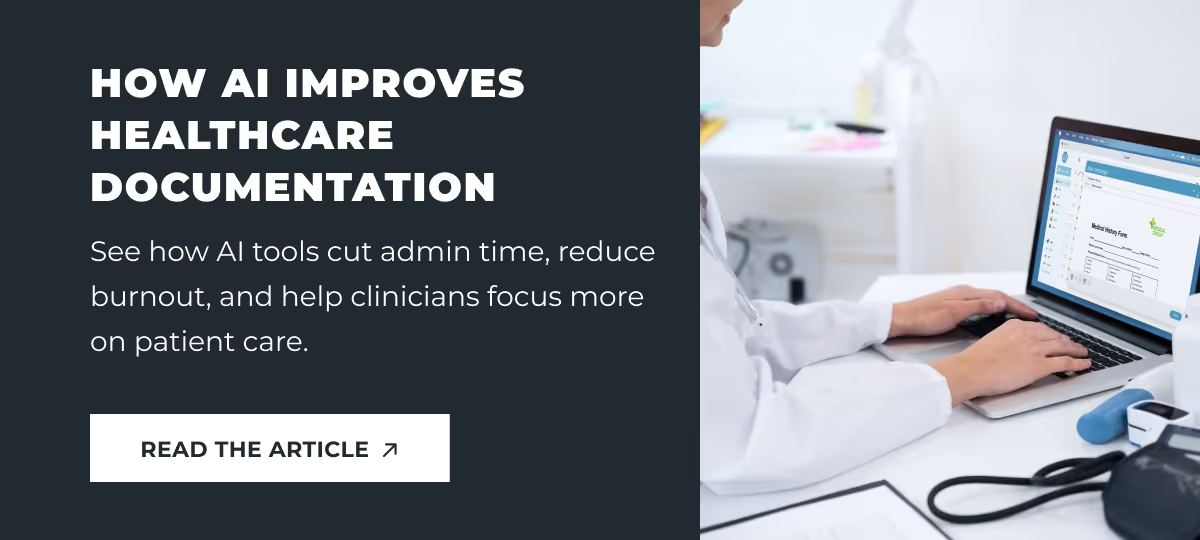
Challenges and Solutions in Implementing AI Agents in Healthcare
The benefits are clear, but achieving them comes with its share of challenges like disconnected systems, strict regulations, and the high stakes of patient care. The good news is that each challenge can be solved. Here are the biggest roadblocks and practical advice on how to address them.
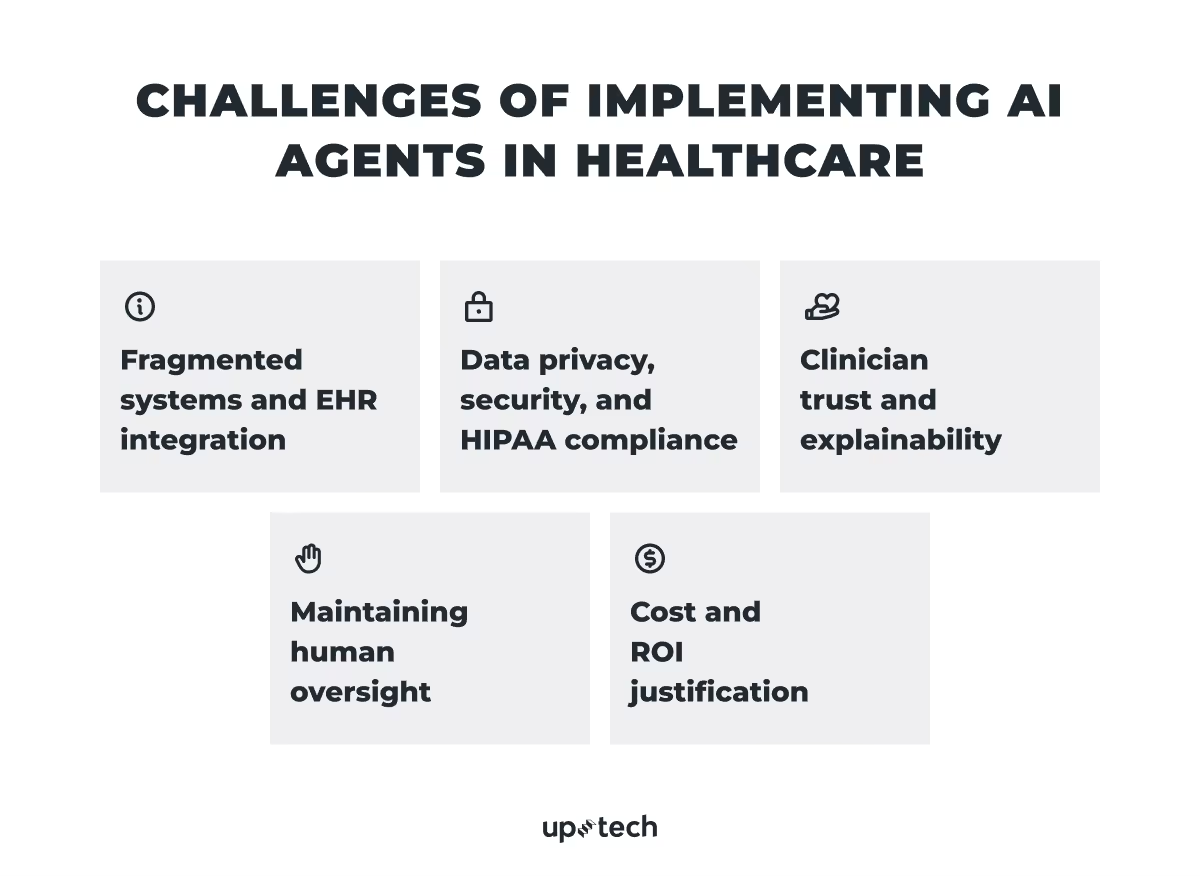
Fragmented systems and EHR integration
Healthcare systems are usually siloed, meaning critical tools like patient records, scheduling software, and billing systems operate separately and don’t automatically share information with each other. For AI agents, these barriers block their ability to pull and push data, trigger actions, and complete workflows end-to-end.
Solution: Use health data exchange platforms (like Redox) to create a single, standardized gateway into patient records, scheduling tools, and billing platforms. This avoids building expensive one-off integrations for every system.
Data privacy, security, and HIPAA compliance
In healthcare, a data breach can lead to significant fines, legal issues, and a loss of patient confidence. AI agents often work with protected health information (PHI): such as names, dates of birth, and medical histories, which means they must comply with regulations like HIPAA in the U.S., GDPR in the EU, and similar laws elsewhere. Even minor system misconfigurations can result in compliance issues.
Solution: Use core systems (electronic health records (EHRs), scheduling tools, billing platforms),. that follow strict healthcare security standards and encrypt all data both when it’s stored and when it’s sent. If you use large language models (LLMs), run them only in HIPAA-approved environments, ideally on your own private cloud or servers, so patient data stays under your control.
Clinician trust and explainability
Clinicians are often cautious about new technology. If an AI agent suggests a billing code or responds to a patient message without showing how it reached that decision, it feels like a “black box.” In healthcare, that lack of clarity creates risk. If staff can’t see and understand the reasoning, they won’t rely on it.
Solution: Build trust by making AI outputs transparent and editable. Use explainable AI that clearly shows why it made a particular suggestion. Give clinicians the ability to accept, reject, or adjust results before they’re finalized. Make it clear that the AI is there to handle routine work, not replace professional judgment.
Maintaining human oversight
AI agents can misread unusual cases, overlook important details, or provide answers that sound convincing but are wrong. The real risk comes when these slips go unnoticed because staff start to assume the AI is always right and stop checking its work.
Solution: AI agents should be designed with a human-in-the-loop approach — working alongside people rather than replacing them. Set clear confidence thresholds so that when the AI isn’t certain, the task automatically goes to a human for review.
Keep staff engaged with simple prompts like ‘Review recommended,’ so they remain active participants in the process. Once the system is live, track how often humans override AI suggestions, review audit logs, and watch for unusual patterns such as sudden changes in decision accuracy or unexpected outputs.
Cost and ROI justification
AI agents can sound impressive, but the real question for leadership is simple: will they save money and improve margins? In today’s budget-conscious environment, vague promises of “future efficiency” aren’t enough to win approval.
Solution: To win support for an AI agent before implementation, start by pointing to a specific, costly pain point the organization is already struggling with. Then, propose a low-risk first step: for example, automating insurance checks or streamlining patient intake, and show how similar providers have achieved measurable results. Outline a short pilot with clear metrics for success and connect the expected outcomes directly to leadership’s priorities.
Uptech’s AI Healthcare Cases
Uptech has delivered several AI-powered solutions that show how the right technology can simplify complex healthcare workflows.
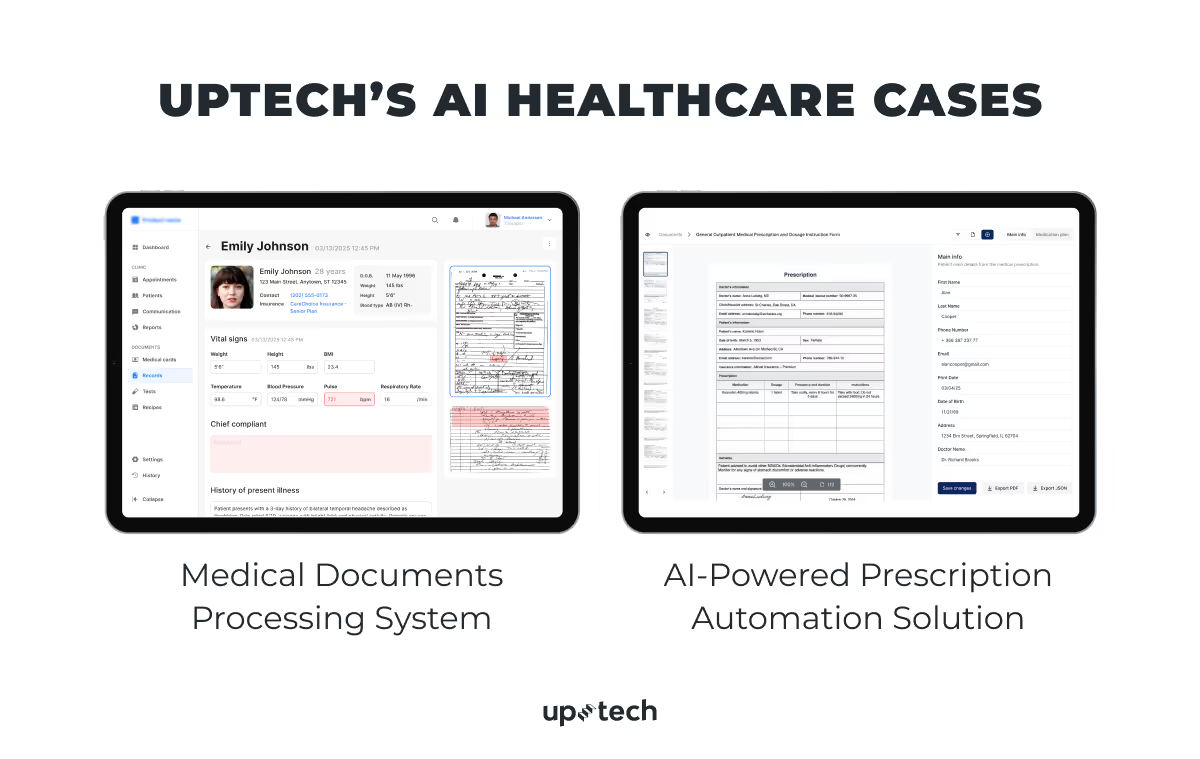
Medical documents processing system
We worked with a private diagnostic clinic dealing with millions of documents each year: lab reports, prescriptions, discharge notes, most of them unstructured. They needed to process them quickly and securely.
Our team built a medical documents processing system that could read, classify, and extract key details from each file, while flagging missing or conflicting information. Using OCR, NLP, and smart search, it cut processing time by 34% and increased patient service satisfaction. Read more details here.
AI-powered prescription automation solution
A digital health startup needed a system that could scan both handwritten and digital prescriptions, merge them into a single medication plan, and generate a barcode pharmacists could scan instantly to prepare orders.
We built a solution trained on varied layouts and file formats, so it can read both handwritten and digital prescriptions with 85–90% accuracy. It then organizes the data into a clear, easy-to-read output. The result: faster processing, fewer errors, and a smoother experience for both patients and providers. Explore our case study to learn more.
Want to find out how AI could solve your operational challenges? Get in touch for a free consultation, and let’s explore the right solution for your needs.
